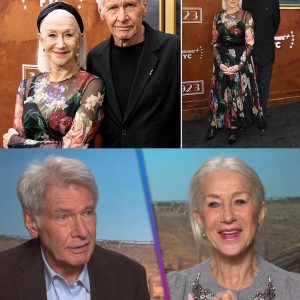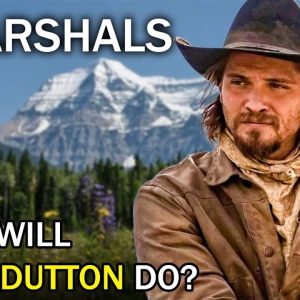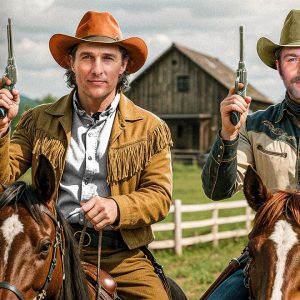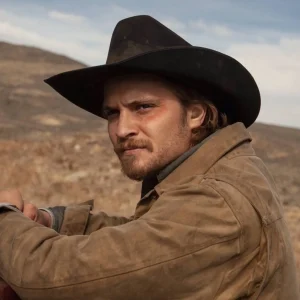The Silence Around ‘Why Marshalls’: Is the Yellowstone Empire at a Crossroads?
Something strange is happening in the Yellowstone universe—and it’s louder than words. Amid the thunderous success of Yellowstone, 1883, 1923, and Lawmen: Bass Reeves, a curious quiet has fallen over Why Marshalls, the next ambitious installment supposedly poised to redefine the franchise. And yet… there’s no trailer. No casting announcement. No press buzz. And—most shocking of all—Taylor Sheridan, the man who has written every syllable of the franchise’s soul, appears to be stepping into the shadows.
Is this a calculated pivot from a creative mastermind? A studio power play? Or the first real crack in what has been one of modern TV’s most potent storytelling empires?
Let’s pull back the curtain on the mystery surrounding Why Marshalls—because the story goes far deeper than missing press releases.
Why Marshalls: The Enigma at the Heart of the Sheridanverse
When Why Marshalls was first announced, the premise was clear: a grittier, modern dive into law enforcement in the American West, focusing on a group of elite U.S. marshals chasing fugitives and wrestling with justice far removed from ranches and cattle. It was meant to pivot the Yellowstone universe into new territory, swapping pastures and family legacies for manhunts and federal conflict. And yet, all we’ve seen so far… is silence.
No cast has been confirmed. No behind-the-scenes leaks. Not even a logo.
Compare that to 1923, which had marketing materials, teaser posters, and a full cast reveal long before the first camera rolled. By those standards, Why Marshalls is a ghost—and that silence is deafening for fans used to Sheridan’s meticulous, hands-on world-building.
So what’s really going on?
A Creator’s Retreat: Sheridan’s Mysterious Disengagement
The most jarring piece of this puzzle is that Taylor Sheridan reportedly will not be writing, showrunning, or steering Why Marshalls. This is a seismic shift for a creator who famously wrote every episode of 1883 himself and was deeply involved in casting, directing, and even costume choices. His creative fingerprints have defined the tone of the Yellowstone universe: morally complex, unflinching, and emotionally raw.
The idea of a spin-off existing without his intense involvement raises a haunting question for die-hard fans: Can the Yellowstone universe survive without its creator at the helm?
And more crucially—what does this absence say about the internal dynamics at play?
Some insiders speculate that Sheridan, whose slate includes Landman, Bass Reeves, Special Ops: Lioness, and possible feature films, may be stretching himself too thin. Others suggest that Paramount+ is using Why Marshalls as a test balloon—a way to see if the brand can thrive without Sheridan driving every word.
Either way, fans are noticing the absence, and the unease is real.
Power Shift or Power Struggle?
A key mystery surrounding Why Marshalls is: Who is in charge now?
There’s no named showrunner. No confirmed creative team. The hush around this leadership vacuum has sparked theories ranging from strategic secrecy to behind-the-scenes tension between Sheridan and the network. Could someone from Mayor of Kingstown or Lioness be stepping in? If so, we may see a tonal shift—a more procedural, grittier format, which could either reinvent the brand or clash with its signature narrative style.
Yellowstone has always been about people first—their wounds, their grudges, their loyalties. If Why Marshalls leans too far into high-stakes action and loses that emotional thread, it could risk becoming just another crime drama in a landscape already saturated with them.
And therein lies the risk: can someone else maintain the philosophical complexity, the moral ambiguity, and the aching beauty that defines Sheridan’s voice?
Sheridan’s Evolution: From Writer to Mogul
This isn’t just about one show. Sheridan’s decision to step back from Why Marshalls reflects a larger pivot—from writer to executive visionary.
Once hailed for personally scripting every word of his series, Sheridan is now delegating, mentoring collaborators, and focusing on selective involvement in key projects. His evolving role mirrors that of industry titans like Shonda Rhimes or Ryan Murphy—architects of worlds they no longer inhabit day-to-day, but still shape through strategic influence.
It’s a smart long-game. By taking a bird’s-eye view, Sheridan can ensure longevity. But the trade-off is real: intimacy fades, and so does the immediacy of his storytelling voice.
Already, fans have noticed tonal differences in his newer shows. Bass Reeves impressed many but lacked the soul-scorching intensity of 1883. Lioness divided critics. If Why Marshalls also misses the mark, the narrative becomes clear: the Yellowstone empire is only as strong as the man who built it.

High Stakes and Fallout: The Future of the Franchise
What happens with Why Marshalls will shape the future of every Yellowstone spin-off to come.
1923, once a juggernaut with Harrison Ford and Helen Mirren, has slowed as Sheridan juggles responsibilities. With rumors of delayed scripts and a possible 2026 return, fans are worried the series could lose its emotional weight without Sheridan’s full involvement.
Meanwhile, Landman—a gritty look at the Texas oil boom—is Sheridan’s next big passion project. It represents a key stress test: can a series succeed with Sheridan guiding from above, but not embedded in the writing room?
Then there’s Four Sixes, Lawmen sequels, and untitled Dutton-era entries potentially in development. All of these may hinge on the success or failure of Why Marshalls.
If this spin-off soars, it opens the door to a Yellowstone cinematic universe—where multiple creators expand the mythology Sheridan started. But if it falters, the message is clear: Yellowstone is no longer just a brand. It’s a soul. And only Sheridan can speak it.
Final Thoughts: A Legacy in Flux
Taylor Sheridan is not burning out. He’s evolving. What looks like retreat may be strategic delegation. But Why Marshalls is the canary in the coal mine—a critical test of how far his empire can stretch without unraveling.
This isn’t just another show.
It’s a pivot point. A power shift. A signal flare for fans, creators, and networks alike. If it misfires, it could fracture the trust that has made Yellowstone one of the most emotionally gripping franchises in modern television. But if it lands, Sheridan may have just rewritten the playbook for how to build an empire—and sustain it for decades.
Either way, the silence surrounding Why Marshalls speaks volumes.
And fans are listening.





